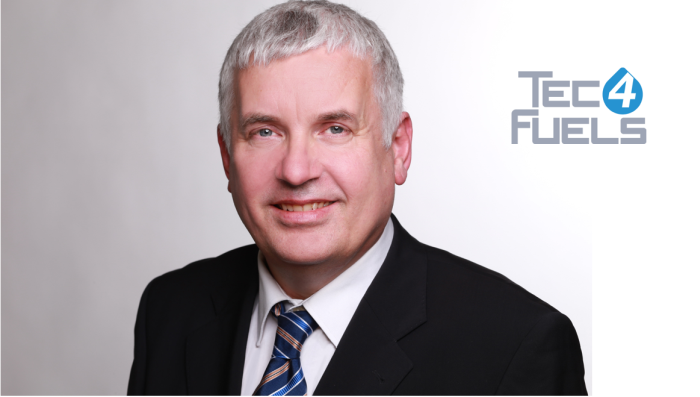My name is Werner Willems and I work as Business Unit Manager at Tec4Fuels in Herzogenrath near Aachen in Germany. In the E-TANDEM project, Tec4Fuels is supporting various Work Packages, such as WP3, where Tec4Fuels is performing HiL (Hardware in the Loop) testing of injection systems to investigate the fuel compatibility of the E-TANDEM fuel blends with conventional marine diesel. In addition, in Work Package 4, Tec4Fuels is supporting the development of a water treatment system approach to recycle process water to improve the efficiency of the overall fuel production process. In addition to the technical work, Tec4Fuels is also supporting the management of key results in Work Package 5.
What was your original motivation to become a researcher?
As a child I was fascinated by science fiction literature and films. This actually motivated me to become an aerospace engineer, hoping to develop new propulsion systems for aircraft and rockets. However, after completing my PhD, I joined the automotive industry where I developed combustion systems for modern internal combustion engines. It was here that I became very interested in sustainable combustion with CO2-neutral fuels, which is still my favorite topic when I left the automotive industry and joined Tec4Fuels’ fuel research. Here I want to use my expertise in sustainable synthetic fuels to take sustainable fuel production to the next level.
What is your (main) research area today?
At Tec4Fuels, we are looking at different energy sources along the entire value chain, from production to applications. In particular, synthetic fuels and their production processes are one of our main research areas. Here we are trying to develop new efficient concepts for fuel production, including new approaches to capture CO2 and water quality improvements, which are key ingredients to synthetic fuel production. We are also looking at new ways of storing renewable energy in power-to-power concepts (e.g. iron-based energy storage).
What is the main objective of your team in E-TANDEM?
In the E-TANDEM project, we have two main objectives. The first is to verify that the newly derived synthetic fuel is compatible with injection system technology. Ideally, a drop-in quality would be desirable, meaning that the fuel can be blended with conventional fuel up to a certain blend ratio without affecting the physical properties and durability of the components associated with the fuel injection system. Sealing materials also have an important role to play here, and this is being investigated in dedicated studies with our partners at OWI. The second technical focus is on water purification concepts. Significant amounts of water are processed during the fuel production process and will also be present in the raw product. Together with the other partners, Tec4Fuels is developing a purification concept to clean the contaminated process water so that it can be used as an input for electrolysis, thereby increasing the overall efficiency. In addition to the technical investigations, Tec4Fuels will also support the management of the project and take care of the tracking and management of the key results of the project.
What expertise and facilities does your team have to meet those objectives?
Tec4Fuels has a long history of working with fuels and their related quality. Traditionally coming from conventional fuels, Tec4Fuels has developed methods and technologies (i.e. hardware-in-the-loop testing) to analyze and evaluate the performance of fuel candidates on dedicated test rigs at its facility. In publicly funded projects such as C3-Mobility or IDEAL-Fuel, we have learned and demonstrated the ability to provide reliable evidence of fuel performance and its impact on durability. Tec4Fuels has also developed and experimentally investigated water purification systems. We have already demonstrated our capabilities in other research projects such as H2Giga in Germany, but also in new applications such as in the Middle East and North Africa.
Which aspects of your research at E-TANDEM do you believe are the most innovative and what unique opportunities does E-TANDEM offer to you and/or your organisation?
The E-TANDEM project is looking at a new class of fuel (long chain ethers and alcohols) that we have not looked at before. In essence, this gives us the opportunity to learn about the potential challenges for fuel operation and handling for potential applications in marine applications. Working with the other partners in a larger team gives us the opportunity to interact and learn from each other, and together come up with a promising solution in order to defossilize the shipping sector.
How do you see the future use of the E-TANDEM results and the impact of the E-TANDEM project in our daily lives?
Due to the energy density required, the shipping industry will be dependent on carbon-based fuels for the foreseeable future. Carbon neutral fuels will therefore be required to power ships around the world. The price of carbon neutral fuel will determine the cost of transport and therefore the price of the products transported. It will therefore affect the prices we pay when we buy these goods in the shops. An efficient way of producing the fuel is therefore crucial, while maintaining the performance of conventional fuels without the need to modify the propulsion hardware. The E-TANDEM project can therefore make an important contribution to finding a solution.

